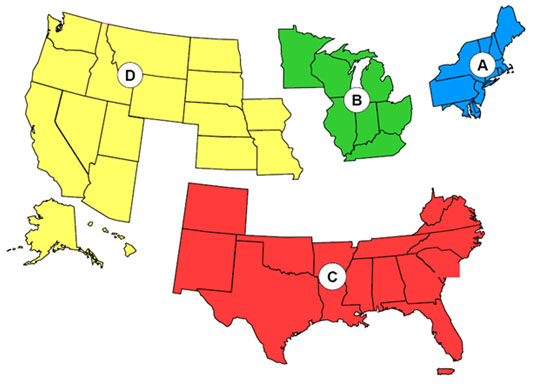2011 is the year that Medicare expands its Recovery Audit Program to include providers such as medical laboratories and pathology groups
During the next 12 months, many pathology groups and clinical laboratories will undergo their first audit as part of Medicare’s recently-expanded RAC (Recovery Audit Contractor) program. This is a big-dollar audit program. When Congress passed the enabling legislation, it was estimated that RAC would generate $10 billion in recoveries from hospitals, physicians, medical laboratories and other providers.
In 2010, RAC activities that targeted hospitals were expanded nationally, as mandated by law. In 2011, RAC contractors began conducting audits at other types of providers, including physicians, pathology groups, and medical laboratories. This is why pathologists and clinical laboratory managers now see RAC auditors showing up at their organizations.

Here are the four Medicare RAC (Recovery Audit Contractor) regions. The American Hospital Association maintains a Web page with more details about the RAC contractors assigned to each region. That link is: http://www.aha.org/aha/issues/RAC/contractors.html. (Imaged sourced from www.AHA.org)
The dollars involved in RAC audits quickly became substantial. Modern Healthcare magazine reported in April 2011, that RAC audits of hospitals had generated $162 million in recovered funds to the Medicare program in just the first three months of 2011.
Criticism of RAC Audits by Hospital Administrators is Surfacing
For hospitals, the national deployment of RAC is having another unanticipated consequence. Private health insurance plans are instituting their own audit programs modeled on Medicare’s RAC program. “It’s really become a burden to providers because they’re getting it from all directions,” commented Steve Lefar in an interview with Health Data Management magazine. Lefar is General Manager of the Wolters Kluwer Health Care Portfolio, and was President of MediRegs (a regulatory compliance software company based in Needham, Massachusetts) before it was acquired in 2007 by Wolters Kluwer Law & Business, a unit of Wolters Kluwer based in Riverwoods, Illinois.
Lefar’s observation was mirrored by Belinda Kisley, RAC Coordinator at Aurora Health Care in Milwaukee, Wisconsin. This system operates 15 hospitals and 155 clinics. Kisley noted that private payers are copying RACs “and that has really increased audits across the board.” Aurora Health Care has already experienced multiple RAC audits.
The reporter for Health Data Management magazine wrote that “almost constant auditing is a well-established hallmark of the RAC program.” This is a significant observation, because it means that audit activity is likely to become more common for all types of healthcare providers. This is a reason why both clinical laboratories and pathology groups may want to take steps to assess their current coding/billing/collections practices and compliance policies to ensure that they are consistent with the evolving requirements of Medicare, Medicaid, and a growing number of private health insurers.
Many Clinical Laboratory Managers Not Prepared for a RAC Audit
To help pathology groups and clinical laboratories in their preparation for RAC audits, The Dark Report and Dark Daily are conducting a special audio conference on this topic. It is titled: “Prepare Your Lab for a Medicare RAC Audit: Essential Do’s and Don’ts to Reduce Compliance Risk and Avoid Penalties,” and will take place on Wednesday, July 20, 2011.
To give you a precise overview of the RAC program and the key legal and compliance issues that must be addressed by your clinical laboratory or pathology group will be attorney Jane Pine Wood of McDonald Hopkins, LLC. She is nationally-recognized for her experience and acumen on legal and compliance issues in laboratory medicine.
Next, you’ll learn how an actual RAC audit was conducted at a major regional pathology group practice. Guiding you through the experience of his group practice will be Tom Rehwald, CPA, who is Chief Financial Officer of InCyte Pathology, PS, based in Spokane, Washington. This group of 24 pathologists has lessons to share in how to best prepare for a RAC audit.
Within the medical laboratory testing industry, not much publicity has been given to RAC audits and the types of procedures that are likely to get the most attention when the RAC auditor shows up at clinical laboratories and pathology groups. Thus, outside of the clinical laboratory’s compliance department, many senior-level lab administrators and medical directors understand few of the details about the RAC audit process.
Register today and get the best, most up-to-date information on how to prepare your lab for a RAC audit. And don’t forget: Everyone on your lab team can participate with you. For just one registration, you can all listen, learn, and get personalized answers to questions about your lab’s unique needs. Register now to guarantee your participation.
Related Information:
Recovery Audit Contractors (RAC) and Medicare: The Who, What, When, Where, How and Why? (PDF)
CMS RAC Program Collects $162 Million in Overpayments in First Three Months of 2011
Sorting Through Medicare RAC Audits
Warning to Clinical Pathology Laboratories: Medicare’s RAC Program Expands on December 31st!



